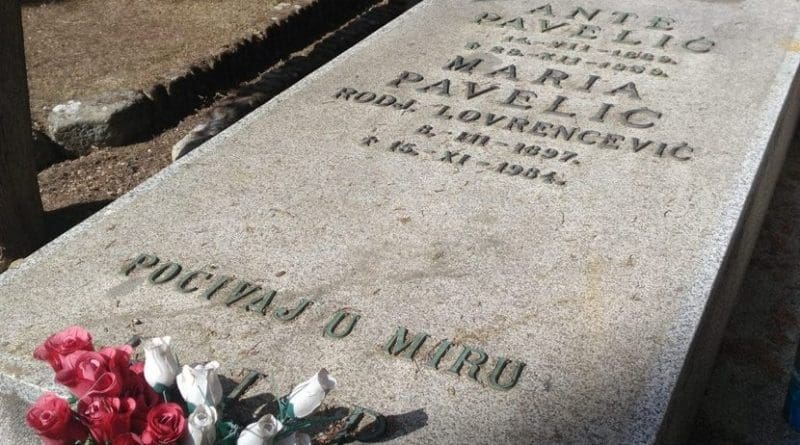Croatian Fascist Leader’s Tomb Vandalized In Spain
By Anja Vladisavljevic
The tomb of Croatia’s WWII Fascist leader Ante Pavelic, whose remains lie buried in the San Isidro cemetery in Madrid, Spain, was vandalised with graffiti written in Cyrillic, a five-point star and a hammer and sickle symbol, local Croatian media reported on Tuesday.
The grave of his wife Mara, son Velimir and daughter Visnja were also damaged.
According to Croatian media, a three-person committee, set up after Visnja’s death in 2015 to keep the Pavelic memory alive, and formed of her niece and two members of the Croatian diaspora, have called for the cemetery owner to repair the damage and clean the graves, which lie in the San Isidro cemetery in Madrid.
They argue that “every dead person has the right to a designated gravestone”, according to media reports.
Between 1941 and 1945, Pavelic’s NDH adopted Nazi-style racist laws and severely persecuted Serbs, Jews, Roma and Croatian anti-Fascists; according to an official name-by-name list, 83,145 victims of the regime perished at the main Ustasa-run concentration camp at Jasenovac in central Croatia.
After fleeing the state in 1945, Pavelic reached safety in Argentina where he continued his political activities. A Serbian émigré, Blagoje Jovovic, shot him in Buenos Aires in 1957, but he survived.
Pavelic then shifted to friendly Spain – due to his good relations with Franco’s regime – where he died in 1959, aged 70.
In June last year, Spain’s centre-left-led government proposed a law on historical memory, designed to deal with the memory of the Spanish Civil War of the 1930s.
Under the proposed law, the tombs of fascist leaders would be moved, to avoid them serving as places of pilgrimage for far-rightists.
Spain’s Socialist Prime Minister, Pedro Sanchez, said in June 2018 that the tomb of former dictator Franco should be moved from the massive Valle de los Caídos, or Valley of the Fallen, near Madrid. Alongside this, the tombs of Croatia’s WWII Fascist leaders Pavelic and Vjekoslav Maks Luburic, who is buried in Valencia, would have to be moved to less prominent sites, or back to their homelands, now present-day Bosnia and Herzegovina.
However, it is not known whether this law will be implemented, as Spain is due to hold snap elections in April this year.

